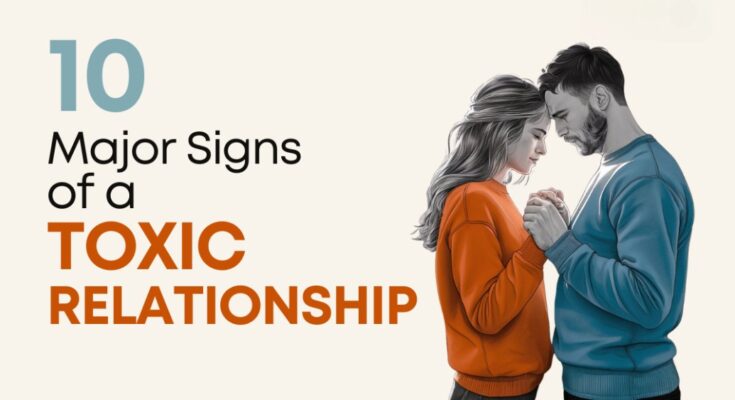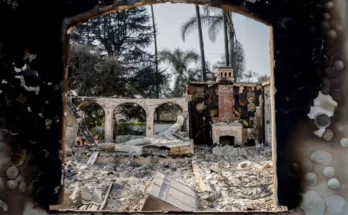Before we begin this super in-depth guide on the signs of a toxic relationship and how to deal with it, let’s take a quick quiz to see if you’re in one. Answer the following questions with a yes or no:
| 1 | Do you feel emotionally drained and mentally exhausted after an exchange with your partner (or any other relation you’re having problems with)? |
| 2 | Do you feel like walking on eggs shells all the time, being careful of what to say and how to act in the presence of this person? |
| 3 | When having a conversation, is it always about them and never about you? |
| 4 | Do you always try to be there for them and they’re rarely ever there for you? Does this relationship feel one-sided and you’re tired of giving endlessly and not receiving? |
| 5 | When you share your thoughts, emotions, experiences, or whatever you’re going through, do they ignore you and change the subject? |
| 6 | Is your relationship very volatile, going through peak highs and lows too often? Oscillating between loving bombing and having huge fights on a day-to-day basis? |
If you answered most of these questions with a Yes, you’re probably dealing with a toxic relationship.
There are a lot of things that contribute to making a relationship toxic. No two relationships are the same. Knowing the symptoms and traits of a toxic relationship will help you understand where your relationship stands and whether it is worth trying to fix or if it’s better to move on.
A couple of years ago, I wrote a big beefy guide on How to Fix a Toxic Relationship, which has been read by tens of thousands of people and received lots of positive feedback through comments, emails, and messages about how it impacted the lives of many of the readers.
I’m truly humbled and grateful that I get to serve you all.
One major aspect that I had to leave out of that guide due to the sheer length of that article, was how to identify toxic behaviors in a relationship and the signs of a toxic partner.
For some, it’s clear as day that they are in a toxic relationship. However, a lot of people stuck in a struggling relationship don’t even know that their relationship has gradually turned toxic over time or that they might be dealing with a toxic partner.
In this guide, we’ll go in-depth into identifying the toxic behaviors and patterns in an unhealthy relationship. To summarize, here’s what we’ll cover:
- The Difference Between a Toxic Partner and a Toxic Relationship
- 12 Red Flags of a Toxic Partner
- 10 Common Toxic Relationship Patterns
- Why do relationships Become Toxic?
- Fixing a Toxic Relationship
- How do I know if I’m the Toxic one?
- When you should quit a toxic Relationship
The Difference Between a Toxic Partner and a Toxic Relationship

This might be surprising and confusing at first. How can a relationship be toxic without a toxic partner?
A lot of the content on the internet surrounding the topic of toxic relationships uses these terms synonymously and paints all toxic relationships with the same brush which isn’t helpful in deciding whether to stay and work on the relationship or is it time to leave.
Being in a toxic relationship and being with a toxic partner can be two very different things. It’s important to understand these 2 distinctions.
1. Toxicity Because of Toxic Partner
Some relationships are toxic because of the personality issues of one of the partners. The toxicity existed way before the relationship. It was part of their nature.
When the person got into the relationship, they brought that toxicity with them which became apparent in the first few months of the relationship.
2. Toxicity because of Toxic Relationship Patterns
The other category of a toxic relationship is the one that started out great but turned toxic over a long period of time (usually years). The transition to toxicity was so gradual that it’s often confusing for the couple to understand what went wrong.
They might think that they’ve just lost the spark in the relationship or they have changed as a person. While these 2 are completely valid concerns, they’re usually not the root cause of the relationship turning toxic in such scenarios.
The root cause of toxicity in this scenario is not because of personality disorders but because of the patterns, the couple has unknowingly developed over the years.
The two individuals would be completely fine otherwise. However, when they interact with each other in certain situations, they tend to fall into patterns that create friction between them, leading to frustration, misunderstanding, and resentment.
Is a Toxic Relationship Fixable?

The second type of toxic relationship is often easier to fix since there are no particular personality issues to deal with (which can be difficult to fix and take a long time).
Identifying the toxic patterns in the relationship and bringing them into conscious awareness resolves half of the problem. Since both partners share equal responsibility, it’s easier for them to work together and identify their own individual patterns.
The first type, however, where one partner has permanent toxic personality traits can be more challenging to deal with.
Whether or not such a relationship can be fixed depends on if the problematic individual realizes their impact on the relationship and is willing to work on themselves seriously through therapy or other means of self-improvement.
Now, a lot of people automatically assume the 1st reason for their relationship problems, i.e. their partner being the toxic one since it’s difficult to consider the fact that we too can equally be a part of the problem.
It’s easier to blame our problems entirely on others or the circumstances and it’s difficult to accept our share of responsibility.
While assessing which category your relationship belongs to, you have to be brutally honest with yourself and try to analyze things objectively. Promise?
10 Common Patterns/Signs of Toxic Relationships

A relationship can turn toxic without one of the individuals having narcissistic and toxic tendencies. Such people did completely fine before getting into a relationship.
They never had any significant problems with their personal and professional relationship.
Even after getting married, they had a great relationship as a couple. But over the years, things gradually started to go downhill.
The question then is:
Why do relationships Become Toxic?
A lot of people think it’s because they’ve lost the spark in the relationship, and yes that might be the case, but what actually caused that loss?
When things are going great in our lives, a lot of us start taking our relationships for granted and stop putting conscious effort toward keeping the spark going.
We stop putting in the extra kindness, consideration, and mindfulness that we once used to put into the relationship in the initial years.
We become careless of the things that might be causing gradual detriment to our relationship.
We don’t see any significant impact of those habits and behaviors as they aren’t as clearly toxic as someone having a toxic personality. But the small hits that those habits give to the relationship over and over for years, eventually lead to big cracks.
The good news is that they can be fixed if both partners realize how far they’ve come from their once-loving and nurturing relationship and are willing to put in the effort to restore it while avoiding the things that led to the currently unhealthy state of their relationship.
Below we’ll be discussing some of those unhealthy habits and traits of a toxic relationship that we must always be consciously aware of and avoid falling into those behaviors at all costs.
1. Lack of Expressing Affection and Bonding Rituals

The beginning of an intimate relationship often seems so heavenly because we’re subconsciously engaging in bonding rituals and openly expressing our affection and love through deep care and consideration.
That is the essence of the honeymoon phase.
Some people keep practicing bonding rituals/acts of affection long after their honeymoon phase which is what keeps the spark alive in the relationship.
You fall in love at the start of the relationship but to keep that love alive for years and decades and to keep the relationship healthy through the thick and thin of life requires conscious and consistent effort, and that’s what many of us miss out on.
We become complacent and let ourselves go. We let things happen to our relationship without being mindful of the effect they might have down the road.
In the 18-Step Guide to Fix a Toxic Relationship, I have included a thorough list of bond rituals that you can start incorporating in your love life and start reaping benefits immediately (God-willing).
2. Losing Your Sense of Individuality in the Relationship

Over the years, especially after starting a family, a lot of us tend to become so enmeshed in our relationships that we lose touch with ourselves.
It’s like we forget that we exist as separate individual entities. Our sense of identity begins to revolve solely around our spouse and kids.
Again, it’s a completely natural thing to happen initially.
It’s expected that we will be somewhat enmeshed as a newlywed couple or as a parent to a newborn child. But when that enmeshment lingers on to the point of us losing our individual identity, that’s when things can start to get toxic.
In my other Enmeshment vs Intimacy: Signs of Enmeshment in a Romantic Relationship guide, I’ve covered the topic of Enmeshment vs. Intimacy in a lot more detail. Feel free to check it out.
3. Lack of Consistent Effort to Keep the Relationship Healthy

As a couple, you often realize the problems in the relationship and you mutually make a commitment to put the effort to bring a positive change in your lives, but after a few days or weeks when things start to get better, you become complacent.
You forget the lessons you learned and the intentions you made. It seems like all of that was just in the heat of the moment.
One of the differences I’ve observed between healthy and unhealthy relationships is that in healthy ones, people stick to change.
They learn the hard lessons from their mistakes and make a promise to themselves to never repeat them. They work on disciplining their ego and hold themselves accountable for it.
Whereas in unhealthy relationships, one or both of the partners make intentions superficially based on their current emotional state but they don’t have a fixed action plan or a strategy to actualize their intentions.
Even if they do come up with an action plan, they lack the discipline to carry it through.
The truth is that building a healthy relationship often comes down to personal development and self-discipline. When you start improving and working on yourself, your internal development will begin to reflect in other areas of life automatically, especially your love life.
4. You Feed Each Other’s Toxicity

When one of you gets into a toxic pattern and starts acting out, the other one reacts to it with more toxicity, and so the toxic loop goes on endlessly.
We cannot change someone directly. The only person we have control over is ourselves, but what we can do is influence the situation through our actions.
If you notice your partner starting to get into the toxic flow, you can either feed the baby monster (monster = the toxic pattern, not your partner! ) by reacting, until it grows into a big problem.
Or, you can diffuse the situation by putting out the monster while it’s little by acting proactively and wisely.
It all comes down to understanding each other’s psychology and patterns. If you have some level of understanding of your partner’s nature and psychology, you’ll have a good idea of how to gently influence them out of the toxic pattern.
Sometimes you can simply diffuse the toxicity by listening to them and acknowledging their feelings while avoiding friction.
Other times, you might want to give them some space to sort themselves out.
However you choose to handle the situation, make sure to not get caught up in the toxicity yourself.
The skill of letting go and not taking things personally is a relationship-saving skill.
(Related: Powerful Affirmations for Toxic Relationships)
5. Your Relationship Lack Boundaries

In point no. 2, we discussed enmeshment, which directly indicates a lack of boundaries or weak boundaries in a relationship.
If you don’t respect each other’s personal choices, don’t give each other space, become too nosey about each other’s personal or social life, and have no regard for each other’s personal belongings, you might be having boundary issues.
Check out the Step-By-Step Guide on Boundaries Setting to learn how to set healthy boundaries in your relationship and understand boundary setting in depth.
6. Too Much Focus on “Who’s at Fault” instead of Recognizing the Core Issues

Whenever you go through a rough patch in your relationship, you have a mutual pattern of finding each other’s faults and pointing fingers.
Instead of recognizing your own responsibility in the situation or addressing the core issue neutrally without associating any blame, your mind directly goes into defensive mode, and the best way to defend yourself is to put all the blame on the other person.
7. You are Emotionally Dependent Upon Each Other

Codependency is a common pattern in a toxic relationship, which means one or both of the partners’ mental and emotional states rely solely upon each other.
If you are emotionally dependent, your self-esteem relies upon your partner’s approval. You feel like it’s your partner’s responsibility to make you feel happy all the time, or vice versa, you feel as if your partner’s happiness solely relies upon you and you feel this exaggerated sense of responsibility to deliver.
Being codependent can feel like you’re addicted to your partner. Any sense of pleasure, joy, or worthiness you feel comes from your partner. This severely affects one’s ability to have a mutually satisfying and healthy relationship.
8. There is Mutual Complaining but No Mutual Understanding

While both of you might be quick to complain, you lack the patience or will to understand your partner’s perspective.
Even if it begins to dawn on you what your partner might be feeling or they might have a point, you ignore it by having a quick internal dialogue with yourself trying to defend your position and why you are right.
In short, your ego gets in the way of empathizing with the person you love because it often puts you on the spot.
Sometimes the simplest solutions to complex relationship issues come to us when we stop talking (out loud as well as the chatter within our minds) and start listening with patience and empathy, and often the only thing that gets in the way of this is our ego.
9. Use of Toxic Language Patterns

Many relationships turn toxic solely because of how the couple communicates with each other.
We are fallible humans and every relationship runs into problems at some point in life. That doesn’t have to turn the relationship toxic as long as there are good communication habits.
A couple can reach a resolution to the biggest of problems if they talk to each other with kindness, gentleness, transparency, and patience.
A significant trait of a couple who’s in a healthy relationship is that they don’t use cuss words, toxic remarks, or personal att@ cks or insults. They don’t bring up things from the past during arguments or use any harsh language even when they are angry and arguing.
There’s a level of respect for each other even during the fights. There are lines that they never cross no matter how angry and annoyed they are with each other.
On the other hand, an obvious sign of an unhealthy relationship is the use of sharp language.
Both try to get under each other’s skin during the argument and come up with comments and phrases that are more powerful and hurtful than their partner’s comments.
It’s like a competition of who does the most emotional damage to each other.
Check out the list of 55 most common things toxic partners say and see how many you or your partner use regularly in your relationship.
10. Constant Insecurity in the Relationship

There is usually some sort of insecurity involved in a toxic relationship whether it be personal, social, or professional insecurities.
If one of you feels uncomfortable when the other partner spends some time with their friends or spends some quality time alone, there might be some personal and social insecurity issues.
If you feel like you have to outdo each other in terms of your professional life or if one partner feels bummed if the other one gets ahead of them, there are certainly some professional insecurities in play.
This might sound weird to many, but yes, professional insecurities exist between many couples. Some people have a very competitive nature and like to be above others which can lead to unhealthy competition even among intimate partners.
12 Red Flags of a Toxic Partner
Sometimes the problem is indeed one-sided when one of the partners has certain personality issues that they aren’t keen on fixing.
It’s important to analyze your relationship from an objective point of view and recognize the root of the toxicity while trying to be as unbiased and honest as possible.
To help you recognize if your partner is dealing with personality issues and is the one bringing in the toxicity in your relationship, read my article 12 Traits of a Toxic Partner.
How do I know if I’m the Toxic one?

After reading the signs of a toxic partner and toxic relationship, try to analyze where your relationship stands or if your partner has some sort of personality issues.
Take this as an opportunity to do some self-analysis as well and see if you can find any toxic patterns within yourself that you sometimes fall into.
Accepting responsibility resolves matters quicker than putting blame. If you find some of these toxic traits within yourself, be honest and accept them. This is the first step to making things better and improving the quality of your life and relationships.
At the end of this guide, I’ll be mentioning some additional resources and guides that will not only help you fix toxic patterns within yourself but also help fix the toxicity you are facing in your relationship.
When You Should Quit a Toxic Relationship
Hopefully, by now, you will have had some clarity on where the problem lies in your relationship. If it is something that you both are responsible for and willing to work on, then you must give your relationship a fair chance.
Healing a relationship takes time and lots of patience, as well as consistency in your efforts to build a healthy relationship with your partner.
Trying to change years of automated behavioral patterns isn’t an overnight process but it’s certainly doable. It all comes down to the willingness and commitment of the individual as well as a clear action plan on how to work on fixing things as a couple.
For some people, it can take longer to realize their part in the problem, and it’s only after enough turmoils that they begin to realize they need to change things within themselves if they want to live a healthy and peaceful life.
However, there are relationships that are not just toxic but abusive. Where one partner won’t budge at all. They have zero sense of personal responsibility and no desire to change.
Even when they promise they’ll change, you won’t find their promises to be congruent with their actions and behaviors.
Such a relationship can cause severe mental distress and can affect the mental and emotional well-being of the person dealing with them.
Under such scenarios, after giving the relationship a fair shot and trying all possible solutions, including talking to a therapist and consulting other family members, if things don’t seem to change then it’s better to call it quits.
Leaving a long-term relationship is never easy, but sometimes it’s the best thing to do for the well-being of all people involved, including your children.
I’m usually the one who encourages people to try their best to fix a toxic relationship and leave no stone unturned because most of the time, there are ways to turn a struggling relationship into a healthy one but most people don’t have a clear path or strategy so they quit too early.
But there are times when you’ve put your everything into fixing things and yet things aren’t moving in a positive direction. That might be the time to make some tough decisions.
In my experience and observation, the relationships that become “unfixable” are often because of some sort of personality issue of one or both of the individuals. Sometimes it can be due to compatibility issues as well, but compatibility issues can be resolved if both partners are willing to put effort.
Before you decide, I would sincerely urge you to check out the few guides below on how to fix a toxic relationship and give your relationship a fair chance by applying those strategies.
How to Fix a Toxic Relationship?
One of the first and most popular relationship guides I’ve written on this blog is a thorough guide on how to fix a toxic relationship.
With God’s Grace, it has helped thousands of people improve their relationship issues along with some other guides that cover different aspects of improving your relationships and turning your love life around.
If you’re struggling with a toxic relationship, these are the guides I would highly suggest you go through at least once:
I hope this guide and the other ones serve you well. May you find ease and resolutions to all your problems.
The comments section below is always open. Feel free to ask anything or share your experience.
If you have already gotten out of a toxic relationship and are struggling to heal and move on, please read this guide where I have discussed different phases after leaving a toxic relationship and how to heal from it.
If you’ve found this guide helpful, make sure to bookmark it so it’s easier to come back to it later. Please do share it with someone who might be struggling and stuck in a toxic relationship.
Talk to you soon!



